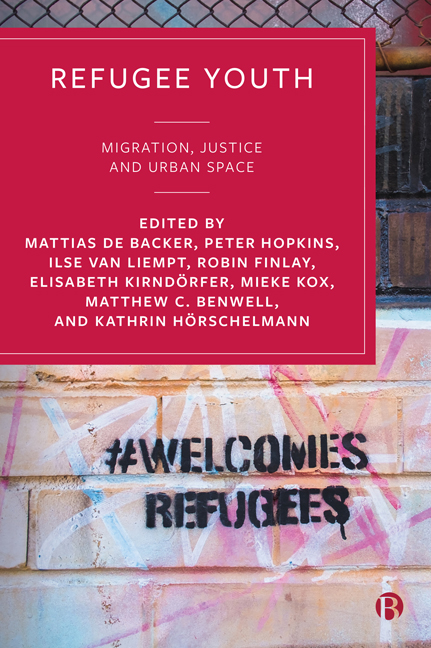Book contents
- Frontmatter
- Contents
- List of Figures and Tables
- Notes on Contributors
- Acknowledgements
- 1 Introducing Refugee Youth: Migration, Justice and Urban Space
- 2 Storying Belonging, Enacting Citizenship? (Dis)articulations of Belonging in a Community Theatre Project with Young Refugees and Asylum Seekers in Leipzig, Germany
- 3 Jackets and Jewellery: Racialised Dispossession and Struggles over Public Space in Denmark
- 4 Venezuelan Refugee Youth and Brazilian Schooling: The Individual between Languages and Spaces
- 5 The Inclusionary Potential and Spatial Boundaries of (Semi-)Public Space: Refugee Youth’s Everyday Experiences in the Urban Fabric of Amsterdam
- 6 Navigating ‘Purdah’ Culture in Urban Space: The Restricted Lives of Young Married Rohingya Refugees in Malaysia
- 7 Inclusive Urban Planning and Public Space for Refugee Youth in Pursuit of a Just City in Amman, Jordan
- 8 Sense of Belonging among Tibetan Refugees in India: A Case Study of the Bylakuppe Settlement in Karnataka, India
- 9 Negotiating Identity in Urban Space: Everyday Geographies of Syrian Students in Istanbul
- 10 ‘You’re Judged a Lot’: Australian Sudanese and South Sudanese Youths’ Perspectives on Their Experiences in Public Spaces
- 11 Hair Salons as ‘Private-Public Spaces’: Exploring the Experiences of Young Migrant Women in an Urban Township in South Africa
- 12 Emotion and Spatial Belonging: Exploring Young Migrant Men’s Emotional Geographies in Cork, Ireland
- 13 Homemaking through Music in Urban Africa: Creating Opportunities as a Refugee and a Migrant in Kinshasa and Dar es Salaam
- 14 Planetary Listening
- 15 Refugee Youth: Politics, Publicness and Visibility
- Index
11 - Hair Salons as ‘Private-Public Spaces’: Exploring the Experiences of Young Migrant Women in an Urban Township in South Africa
Published online by Cambridge University Press: 18 January 2024
- Frontmatter
- Contents
- List of Figures and Tables
- Notes on Contributors
- Acknowledgements
- 1 Introducing Refugee Youth: Migration, Justice and Urban Space
- 2 Storying Belonging, Enacting Citizenship? (Dis)articulations of Belonging in a Community Theatre Project with Young Refugees and Asylum Seekers in Leipzig, Germany
- 3 Jackets and Jewellery: Racialised Dispossession and Struggles over Public Space in Denmark
- 4 Venezuelan Refugee Youth and Brazilian Schooling: The Individual between Languages and Spaces
- 5 The Inclusionary Potential and Spatial Boundaries of (Semi-)Public Space: Refugee Youth’s Everyday Experiences in the Urban Fabric of Amsterdam
- 6 Navigating ‘Purdah’ Culture in Urban Space: The Restricted Lives of Young Married Rohingya Refugees in Malaysia
- 7 Inclusive Urban Planning and Public Space for Refugee Youth in Pursuit of a Just City in Amman, Jordan
- 8 Sense of Belonging among Tibetan Refugees in India: A Case Study of the Bylakuppe Settlement in Karnataka, India
- 9 Negotiating Identity in Urban Space: Everyday Geographies of Syrian Students in Istanbul
- 10 ‘You’re Judged a Lot’: Australian Sudanese and South Sudanese Youths’ Perspectives on Their Experiences in Public Spaces
- 11 Hair Salons as ‘Private-Public Spaces’: Exploring the Experiences of Young Migrant Women in an Urban Township in South Africa
- 12 Emotion and Spatial Belonging: Exploring Young Migrant Men’s Emotional Geographies in Cork, Ireland
- 13 Homemaking through Music in Urban Africa: Creating Opportunities as a Refugee and a Migrant in Kinshasa and Dar es Salaam
- 14 Planetary Listening
- 15 Refugee Youth: Politics, Publicness and Visibility
- Index
Summary
Introduction
Despite a growing body of literature dealing with gender and migration, as well as children on the move, few studies focus on the intersection of gender, age and migration and more specifically the experiences of girls on the move (Save the Children, 2020a). The lack of awareness and understanding of girls and young women who migrate, their experiences en route and their arrival, mean that generalised notions of ‘vulnerable children’ as victims of smuggling or trafficking fill the gap (O’Connell Davidson and Farrow, 2007; Walker et al, 2020). In South Africa, approximately 33.5 per cent of all female African migrants are under 25 (based on the limited data available) (Statistics South Africa, 2015) and the majority are between 16 and 25 (Save the Children UK, 2007). The multiple vulnerabilities faced by girls and young women on the move in South Africa are clear, particularly given the context of increasing xenophobia, extremely high rates of gender-based violence and escalating levels of unemployment. However, this cannot tell the whole story of youth and migration in South Africa and, in fact, overshadows the role of decision-making, strategising and negotiation of private, public and – central here – ‘private-public spaces’ that young women and girls employ in order to survive.
Based on research conducted by the authors as part of a larger study (Save the Children, 2020) commissioned by the International Organisation, Save the Children, to better understand the migration experiences of young women and girls in Southern Africa, Latin America and Europe, this chapter explores these forms of survival. The Save the Children study aimed to address a gap in their global Children on the Move intervention programme around policy and programmatic interventions for girls and young women and to advocate generally for increased understanding of their migration experiences. Drawing from the findings from our participatory research conducted in one of the Southern African sites, we focus on the experiences of 16 girls aged between 15 and 17 and six young women aged from 20 to 22 from Mozambique and living in Thembisa, a township on the outskirts of Johannesburg, South Africa (Save the Children, 2020). The distinction made here between girls and young women is based on the legal definition of children in South Africa. The Children's Act No 38, 2005 defines a child as a person ‘under the age of 18 years’.
- Type
- Chapter
- Information
- Refugee YouthMigration, Justice and Urban Space, pp. 169 - 189Publisher: Bristol University PressPrint publication year: 2023



